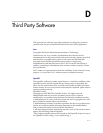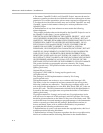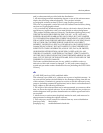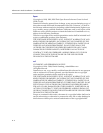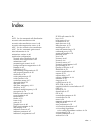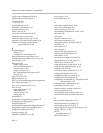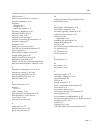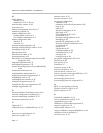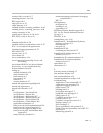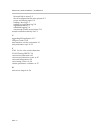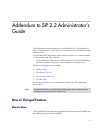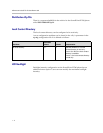
Index
Index – 5
resource files, overview 2–7
restarting phones 3–16, 3–18
RFC support B–2
ring type <rt> A–33
ringer patterns A–31
roaming buddies <roaming_buddies> A–98
roaming privacy <roaming_provacy> A–98
routing <routing> A–94
routing server <server> A–19, A–94
RTP <RTP> A–48, A–49, A–54
S
sampled audio files A–28
sampled audio for sound effects <saf> A–27
SCA. See also shared call appearances
scheduled logging parameters A–72
SDP <SDP> A–9
security <sec> A–73
server menu 3–9
server redundancy 4–34
server-based call forwarding See also call
forwarding
server-based DND See also do not disturb
Services key. See also Applications key
Session Initiation Protocol
setting up
advanced features 4–20
audio features 4–42
basic features 4–1
boot server 3–12
network 3–2
security features 4–47
shared call appearance signaling B–10
shared call appearances
shared calls <shared> A–57
SIP
1xx Responses - Provisional B–6
2xx Responses - Success B–6
3xx Responses - Redirection B–7
4xx Responses - Request Failure B–7
5xx Responses - Server Failure B–8
6xx Responses - Global Failure B–8
application architecture 2–3
basic protocols, hold implementation B–9
basic protocols, request support B–3
basic protocols, response support B–6
basic protocols, RFC and Internet draft
support B–2
basic protocols, transfer B–9
instant messaging and presence leveraging
extensions B–9
RFC 2–1
SIP application
description 2–4
installing 3–14
upgrading 3–17
SIP basic protocols, header support B–4
SIP. See also Session Initiation Protocol
sip.cfg A–4
SIP<SIP> A–10
sound effects <se> A–28
SoundPoint IP / SoundStation IP phones
features, overview 2–8
introduction 1–1
network 2–2
SoundPoint IP 330
switching text entry mode 3–7
SoundPoint IP desktop phones 1–2
features, list of 1–5
SoundStation IP conference phone 1–4
SoundStation IP conference phones
features, list of 1–5
speed dial 4–13
status menu
5–4
T
text entry mode, switching 3–7
time and date display 4–13
time synchronization A–51
transmit equalization <txEq> A–45
troubleshooting
Application is not compatible 5–2
application error messages 5–3
application logging options 5–5
audio issues 5–14
blinking time 5–4
boot failure messages 5–7
bootROM error messages 5–2
calling issues 5–12
Config file error. Error is 5–3
controls issues 5–10
Could not contact boot server 5–2
displays issues 5–13
Error loading 5–3
Error, application is not present! 5–2
Failed to get boot parameters via DHCP 5–2
log files 5–4
manual log upload 5–6





